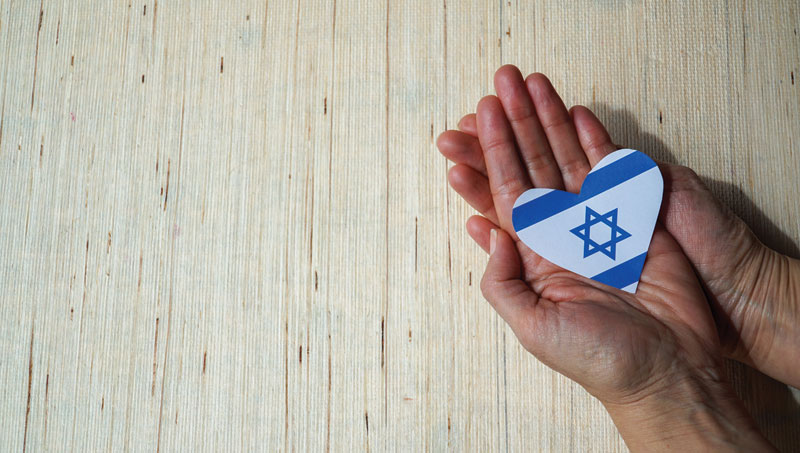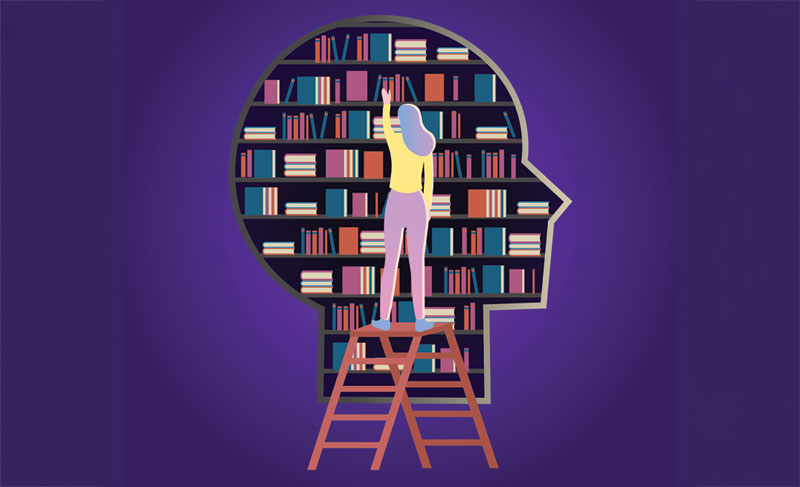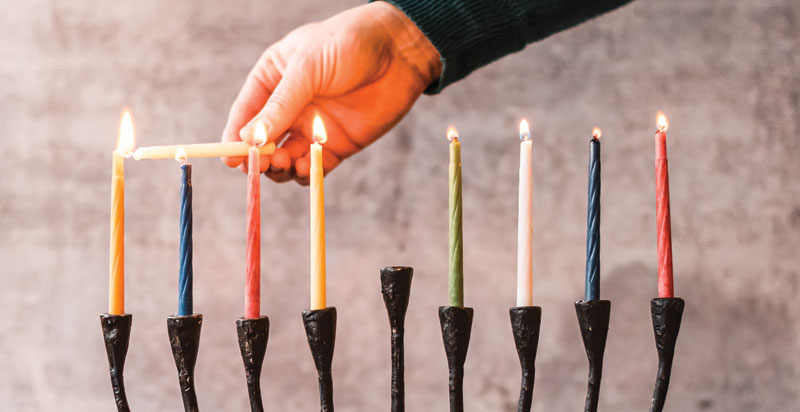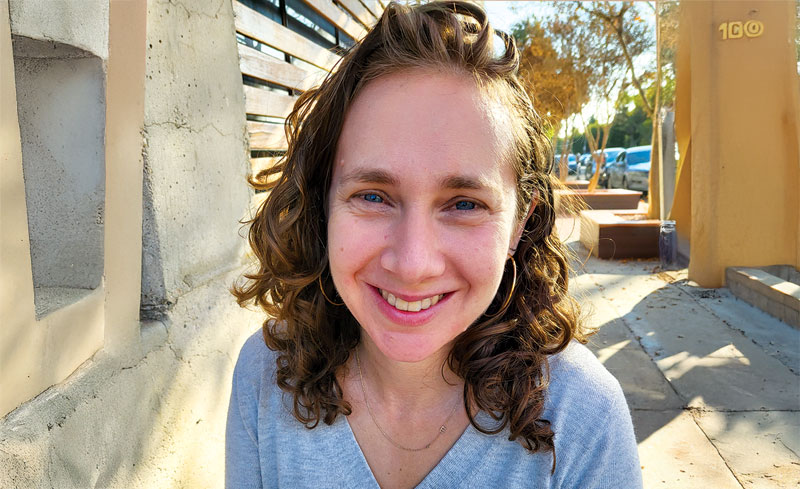
One verse, five voices. Edited by Nina Litvak and Salvador Litvak, the Accidental Talmudist
And Jacob was left alone, and a man wrestled with him until the break of dawn.
– Gen. 32:25
Niva Taylor
Freelance Writer
We find Jacob Avinu experiencing a rare moment of solitude at a critical, defining juncture in his life. The Torah doesn’t tell us how Jacob wound up alone in the darkness; the previous pesukim had him in a flurry of activity, surrounded by family, servants and possessions, preparing for war with Esav. But before he could win the impending physical battle, he would have to prevail on the spiritual front.
War is often a numbers game – the quantity of troops in your regiment is directly proportional to your chances of victory. But when it comes to life’s internal struggles, *aloneness* is a prerequisite for success.
The Chatam Sofer comments that Yaakov withdrew to correct a spiritual flaw, which, once perfected, would enable him to bequeath his signature trait of emet to his progeny forever. But Yaakov wasn’t striving for surface-level truths, relates Rabbi Jonathan Sacks. Rather, he was probing his identity at its core. Who was he and who was he meant to become? Which values were worth fighting for? Were there inner demons – embodied by his sparring partner – preventing him from fulfilling his mission? These questions emanated from the depths of Yaakov’s soul.
It’s uncomfortable to be alone. Many of us avoid it at all costs, doomscrolling on our phones instead of listening to the still, small voice inside that tells us we can do more, know more, be more. We should get to know ourselves at the soul level. For that, some solitude is a must.
Rabbi Tal Sessler
Temple Beth Zion
Jacob Talmon defined Jews as agents of change, a group of people who give rise to individuals who reconceptualize the human condition. From Jews who established Christianity in antiquity to Jews who set the foundations of both socialism and early banking in the modern era, Jews have been at the forefront of diverse human enterprises spanning from nuclear physics to postmodern thought. One specific sphere which Jews helped shape is psychology. Jews pioneered psychological modalities including CBT, REBT, Gestalt, logotherapy, as well as psychoanalysis itself. The sole leading founding father of modern-day psychology who was not Jewish was Carl Jung. Unlike Freud, Jung believed that humans are imbued with intrinsic spiritual strivings, and that later in life we achieve “individuation” — psychological integration. In our verse, Jacob is left alone, and he undergoes a mighty inner battle. This is a liminal moment for Jacob, as he returns to Israel, where he grew up as an introverted youth. Now Jacob returns as an established “businessman,” who heads a large family. Jacob is about to integrate his introspective contemplative self with his worldly self. Dawn represents in our verse the pristine gift of existential lucidity, of realizing with clarity that in a life well-lived we integrate seemingly opposing attributes such as body and soul, spirit and matter, worldliness and soulfulness. Jacob arrives in Israel as an “eesh shalem” — a wholesome human. May we follow in the footsteps of our spiritual namesake Jacob/Israel and achieve this integration, which Jung called “individuation.”
Liane Pritikin
Writer, Torah Speaker
“Psychomachia.” The title of a 5th-century poem, a name which means “battle of the soul.” In TV it’s often depicted as a good angel and bad angel sitting on one’s shoulder in the heat of a decision. In Torah it’s portrayed as Jacob wrestling with someone until the break of dawn. Much has been written about this war, and who this “someone” is. The Rabbis say it’s the angel of Eisav, Jacob’s evil twin brother he’s been fighting with his whole life. Their first battle occurred in the womb — the battle between body and soul lasts a lifetime. Less is said of the setting – when Jacob was alone. Early on we learn it’s not good for man to be alone (Genesis 2:18). The first word of the Torah, Bereshit, “in the beginning,” starts with a letter Bet, the second letter of the Torah. Twoness is good for people. Oneness is not. King Solomon, one of the wisest men who ever lived, acknowledges this in Proverbs: if two lie together, they keep warm; but how can one keep warm alone? Twoness benefits the body but it also benefits the soul. “Woe to one who is alone and falls and does not have another to help.” Our falls are both physical and spiritual. The good angel and bad angel. Our battle continues until we have clarity, the break of dawn. Sometimes that clarity comes when you’re alone. And sometimes you need someone else to give you the dawn of perspective.
Kira Sirote
Author of “Haftorah Unrolled,” Ra’anana, Israel
Jacob was left alone: Good news or bad news? Intentional, or accidental?
The Midrash makes a connection to the verse: “Hashem alone is exalted” (Isaiah 2:11). Hashem is alone, Jacob is alone. The aloneness allowed Jacob to reach exalted heights of prophecy and strength, where he encountered an angel manifesting in this world. The angel was spiritual but wrestled with him in the physical dust; the injury Jacob received was physical. Just as God alone combines the physical and the spiritual, Jacob alone was able to combine the physical and the spiritual.
Or maybe bad news: As it says, “it is not good for man to be alone” (Genesis 2:18). Somehow – we aren’t told how or why – Jacob ended up on the wrong side of the river, without his wives, without his sons, without his staff, alone at night. This made him a target for the force of destruction represented by the angel. Having left him alone, his sons bear the memory of their failure to protect him by refraining from eating a reminder of the injury he suffered.
Alone, unencumbered by the expectations and limitation of others, Jacob wrestled with an angel, and would not surrender. Alone in the darkness, hour by hour, breath by breath, Jacob hung on until the light came.
David Brandes
Screenwriter and still world famous in Canada
Jacob’s life of struggle, lies and deceit has come to this agonizing moment of truth. He is left alone knowing that he will soon face Esau whom he fears has good reason to kill him. Jacob’s life, the future of his family, and the existence of the Jewish people hang in the balance. A dark night of the soul if there ever was one.
Jacob is poised between his past and his future. In his aloneness, he is forced to confront his guilt over stealing Esau’s blessing and deceptively buying his birthright. According to the text Jacob spends the evening wrestling with a mysterious man. But as many commentators suggest, it can be read metaphorically. More precisely he is struggling with himself, his conscience. All night he wrestles. He won’t let the man go. In the struggle, Jacob forces himself to internalize the hurt done to Esau memorialized by the injury to his hip – which we remember to this day.
Jacob is a force of nature, a man of principle and vision. He walked closely with God. Jacob is a transformational character in the Bible who builds on the ethical and spiritual efforts of Abraham and Isaac and magnificently transforms the enterprise from a family to a nation that continues to live and thrive within us… The people of Israel, B’nai Yisrael.























 More news and opinions than at a Shabbat dinner, right in your inbox.
More news and opinions than at a Shabbat dinner, right in your inbox.